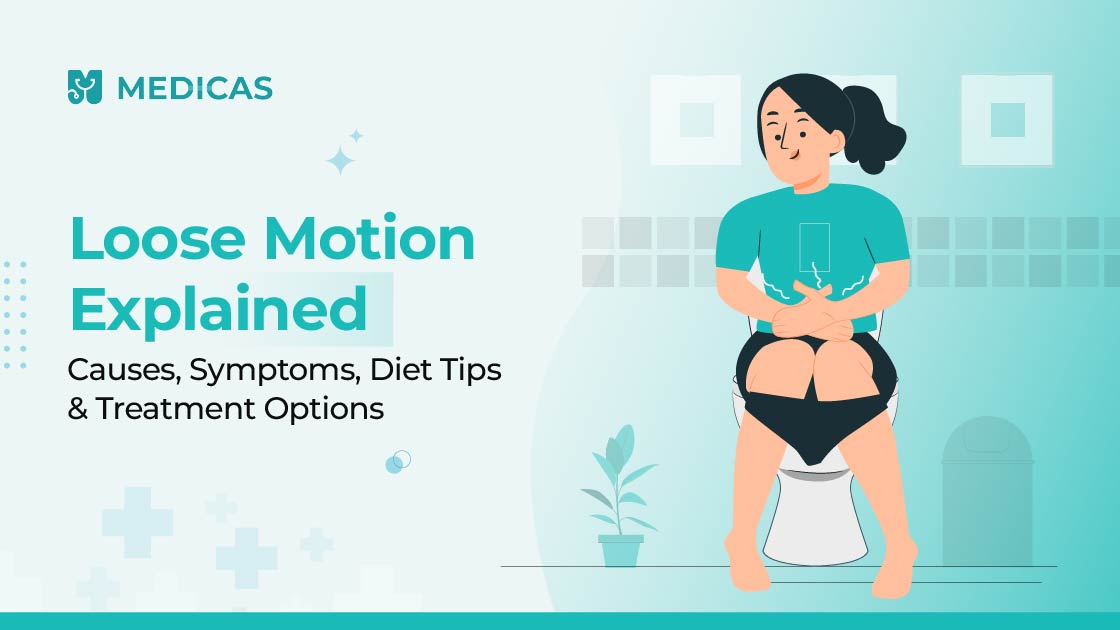That sudden, frequent urge to rush to the washroom, sometimes several times a day, is something most people have experienced. It can strike after eating roadside food, drinking contaminated water, or even during periods of stress. While an occasional loose stool isn’t usually a concern, persistent loose motion is a sign that something’s not right and needs attention. Understanding what causes it, spotting the symptoms early, and knowing how to stop loose motion effectively can make all the difference in getting back to feeling comfortable and in control.
What is Loose Motion?
Loose motion, also known as diarrhoea, refers to frequent, watery bowel movements and is a common symptom rather than a disease itself. It occurs when the digestive system speeds up the movement of stool through the intestines, reducing the colon’s ability to absorb water properly. As a result, stools become loose and urgent. Often, it’s the body’s natural way of flushing out harmful substances, typically due to infections or digestive irritation. While usually short-lived, if left untreated, it can lead to dehydration and weakness, particularly in children and the elderly.
Common Causes of Loose Motion
There are several loose motion causes, ranging from infections to poor digestion:
| Cause | Mechanism | Notes |
| Infections | Viruses (Rotavirus, Norovirus), bacteria (E. coli, Salmonella) | Often accompanied by fever |
| Food Intolerance | Lactose, gluten | Sudden onset after consuming trigger foods |
| Medications | Antibiotics, antacids, laxatives | Alters gut flora, speeds transit |
| Stress and Anxiety | Gut–brain axis disruption | Irritable Bowel Syndrome overlap |
| Dietary Habits | Spicy, oily, or contaminated foods | Common in travellers; “traveller’s diarrhoea” |
| Chronic Conditions | IBS, IBD, celiac disease | May require long-term management |
Poor hygiene and unhygienic food habits (street food, unboiled tap water) are among the most common contributors in day-to-day cases in India.
Symptoms That Accompany Loose Motion
While the most obvious symptom is watery stools, other loose motion symptoms may also appear:
- Sudden and frequent urge to pass stool
- Abdominal cramps or pain
- Bloating and gas
- Nausea or vomiting
- Fever (in case of infection)
- Weakness and tiredness
- Dehydration signs (dry mouth, less urine, dizziness)
Stomach Pain with Loose Motion: Why It Happens
Stomach pain accompanied by loose stools is a frequent complaint. The reasons include:
- Increased Bowel Activity: When the intestines work overtime to expel irritants or excess fluid, the muscular contractions become stronger and more frequent, leading to cramping and pain.
- Inflammation: Infections or inflammatory conditions can cause inflammation of the intestinal lining, making it more sensitive and prone to pain.
- Gas Accumulation: The rapid transit of food and fluids can lead to increased gas production, causing bloating and sharp pains.
- Irritation of Nerve Endings: The presence of irritants or toxins in the digestive tract can stimulate nerve endings, leading to pain signals.
The nature of the pain can offer clues about the cause. Sharp, sudden pains often accompany bacterial infections, while dull, persistent aches might be more indicative of inflammation or chronic conditions.
How to Stop Loose Motion Quickly
If you’re wondering how to stop loose motion quickly, here are some practical measures:
- Hydration: Sip oral rehydration solutions or electrolyte drinks to replace lost fluids and salts.
- BRAT Diet: Bananas, Rice, Applesauce, Toast – these bland foods help firm stools and are gentle on the gut.
- Zinc Supplements: Supported by studies to reduce diarrhoea duration.
- Over-the-counter Antidiarrhoeals: They can slow transit, only under medical advice.
- Rest: Allow the body to recover rather than engaging in strenuous activity.
For immediate guidance, consider an online doctor consultation to ensure the right medicines and timely care.
Effective Home Remedies for Loose Motion
Several home remedies for loose motion have been found helpful:
| Remedy | How it Helps |
| Curd | Restores gut-friendly bacteria, replaces electrolytes |
| Methi seeds (Fenugreek) | Natural anti-diarrhoeal effect |
| Ginger water | Reduces cramps, improves digestion |
| Apple cider vinegar | Antibacterial properties |
| Sabudana (Tapioca) | Easy to digest, helps bind stool |
What to Eat During Loose Motion
Knowing what to eat in loose motion is as important as taking medicines. The right diet can accelerate recovery and help prevent weakness.
| Food Category | Examples | Benefits |
| Starchy Foods | Rice, boiled potatoes, plain toast | Absorb excess water |
| Binding Fruits | Apple (peeled, stewed) | Pectin helps firm stools |
| Lean Proteins | Boiled chicken (skinless, boneless), poached eggs | Aid recovery without irritating the gut |
| Probiotics | Plain curd/yoghurt (with live cultures), buttermilk (in moderation if tolerated) | Restore healthy gut flora |
| Fluids | Coconut water, clear broths | Prevent dehydration |
Introduce foods gradually and observe how your body reacts. The goal is to provide nourishment without further irritating the digestive tract.
When to See a Doctor
Loose motion often gets better within a couple of days, but medical help is needed if:
- Symptoms last more than 2–3 days
- There is blood in the stool
- High fever continues
- Severe dehydration (dizziness, very low urine)
- For infants, the elderly, or people with low immunity
You can also book a lab test to check for markers of infection or dehydration. Don’t wait too long to book an appointment if symptoms worsen.
Final Thoughts
Loose motion may seem minor, but it can become serious if left unattended. Simple diet care, safe hydration, and timely treatment can help manage it quickly. Be mindful of hygiene, especially while eating outside or during travel. If symptoms persist or you’re unsure, consider an online doctor consultation with Medicas experts and gain peace of mind.
Frequently Asked Questions
What causes loose motion? Infections (viral or bacterial), food intolerances, medications, stress, and chronic conditions such as irritable bowel syndrome (IBS) are the primary causes of loose stools. How can I stop loose motion immediately? Start with oral rehydration (ORS), take rest, and eat simple binding foods like bananas and rice. Avoid oily and spicy food. If symptoms persist for 24 hours or longer, consult a doctor. Is stomach pain common with loose motion? Yes, stomach pain accompanied by loose stools is common. It usually results from intestinal cramping or infection. Pain that worsens or continues for more than 1–2 days should not be ignored. When should I see a doctor for loose motion? Consult a physician if diarrhoea lasts more than two days, is severe, presents with blood, or if signs of dehydration develop. Don’t hesitate to book an appointment or take an online doctor consultation for expert advice.
Disclaimer
Medical Advice: The information provided in this blog post is for educational purposes only and should not be considered as a substitute for professional medical advice, diagnosis, or treatment. Always consult with a qualified healthcare professional for personalized guidance regarding your specific medical condition.
Accuracy of Information: While we strive to provide accurate and up-to-date information, the field of medicine and viral fevers is constantly evolving. The content in this blog post may not reflect the most current research or medical guidelines. Therefore, it is advisable to cross-check any information provided with reliable sources or consult a healthcare professional.
Individual Variations: The symptoms, causes, treatment options, and preventive measures discussed in this blog post are general in nature and may not apply to everyone. It is important to remember that each individual’s situation is unique, and personalized medical advice should be sought when making healthcare decisions.
External Links: This blog post may contain links to external websites or resources for additional information. However, we do not endorse or have control over the content of these third-party websites. Accessing these links is done at your own risk, and we are not responsible for any consequences or damages that may arise from visiting these external sources.
Results May Vary: The effectiveness of treatment options or preventive measures mentioned in this blog post may vary from person to person. What works for one individual may not work the same way for another. It is essential to consult with a healthcare professional for personalized advice tailored to your specific needs.

Dr. Jay Chudasama Jagdishbhai is a Consultant Gastroenterologist and Hepatologist based in Mumbai Central. He holds an MBBS, MD (Internal Medicine), DNB, DM, MRCP (UK), and ESEGH. His clinical expertise includes digestive, liver, and pancreatic disorders, with a focus on advanced endoscopic procedures. Fluent in English, Hindi, Marathi, and Gujarati, he provides personalized, multilingual care for a wide range of gastrointestinal concerns.


